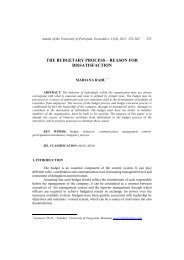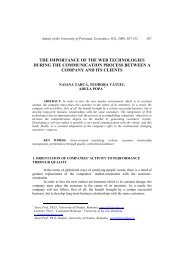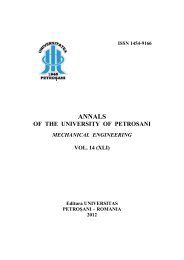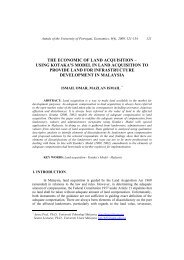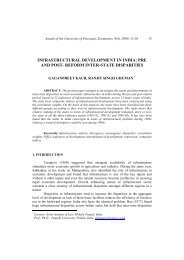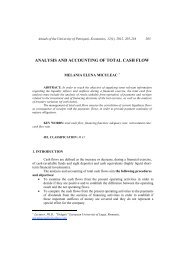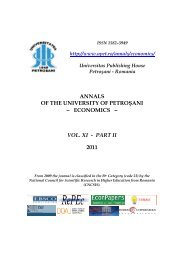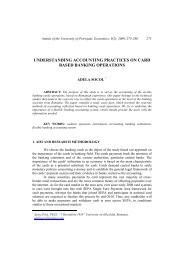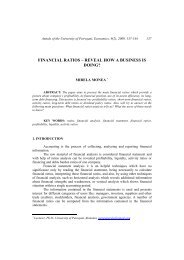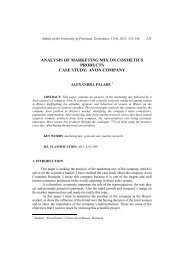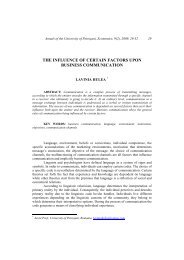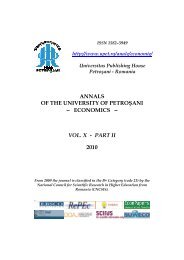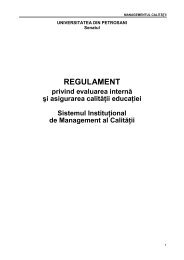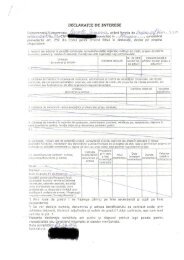annals of the university of petroÅani â¼ economics â¼ vol. xi - part i ...
annals of the university of petroÅani â¼ economics â¼ vol. xi - part i ...
annals of the university of petroÅani â¼ economics â¼ vol. xi - part i ...
Create successful ePaper yourself
Turn your PDF publications into a flip-book with our unique Google optimized e-Paper software.
The Utility <strong>of</strong> <strong>the</strong> Barter Agreement in International Commercial Trade 227<br />
4. Barter. Barter is one <strong>of</strong> <strong>the</strong> most common methods <strong>of</strong> Countertrade. "In a<br />
barter deal, goods are exchanged for goods - <strong>the</strong> principal export is paid for with goods<br />
(or services) from <strong>the</strong> importing market. A single contract covers both flows and in <strong>the</strong><br />
simpler case, no cash is in<strong>vol</strong>ved. In practice, however, <strong>the</strong> supply <strong>of</strong> <strong>the</strong> principal<br />
export is <strong>of</strong>ten released only when <strong>the</strong> sale <strong>of</strong> <strong>the</strong> bartered goods has generated<br />
sufficient cash."<br />
This means if one country sells mining equipment to ano<strong>the</strong>r country in return<br />
for cigars - <strong>the</strong>y will probably hold some <strong>of</strong> <strong>the</strong> mining equipment back until <strong>the</strong>y have<br />
made some good pr<strong>of</strong>it from <strong>the</strong> cigars.<br />
5. Buyback. Here, suppliers <strong>of</strong> capital plant or equipment agree to be paid by<br />
<strong>the</strong> future output <strong>of</strong> <strong>the</strong> investment concerned. For example exporters <strong>of</strong> equipment for<br />
a chemical plant may be repaid with <strong>part</strong> <strong>of</strong> <strong>the</strong> resulting output from <strong>the</strong> factory. This<br />
practice is most common with exports <strong>of</strong> process plant, mining equipment and similar<br />
orders. Buyback arrangements tend to be much longer term and for larger ammounts<br />
than counterpurchase or barter deals.<br />
6. Switch Trading. Imbalances in long term bilateral trading agreements<br />
sometimes lead to <strong>the</strong> accumulation <strong>of</strong> uncleared credit surpluses in one or o<strong>the</strong>r<br />
country, For example, Brazil at one time had a large credit surplus with Poland. These<br />
surpluses can sometimes be tapped by third countries so that, for example UK exports<br />
to Brazil could be financed from <strong>the</strong> sale <strong>of</strong> Polish goods to <strong>the</strong> UK or elsewhere. Such<br />
transactions are known as ‘switch' or ‘swap' deals because <strong>the</strong>y typically in<strong>vol</strong>ve<br />
switching <strong>the</strong> documentation (and destination) <strong>of</strong> goods on <strong>the</strong> high seas.<br />
The Growth <strong>of</strong> Countertrade. The growth <strong>of</strong> countertrade is fuelled by<br />
several factors. First, in addition to looking at <strong>the</strong> advantages for <strong>the</strong> company that<br />
countertrades, one must also look at what advantages a country gets from countertrade.<br />
These are:<br />
• Additional hard currency generation.<br />
• Marketing expertise that <strong>the</strong>y may not o<strong>the</strong>rwise have. This point is brought<br />
out in a recent Wall Street Journal article which describes how McDonnell Douglas<br />
had helped to bring a foreign-based snack food product to Spain.<br />
• Technology advances that <strong>the</strong> country would not o<strong>the</strong>rwise have.<br />
The global demand for international credit is <strong>the</strong> second growth factor. The<br />
need for credit is increasing at a time when banks are less willing or able to finance<br />
<strong>the</strong>se transactions. This forces many purchasers and exporters to turn to countertrade to<br />
finance <strong>the</strong> business transaction.<br />
However, international banks are short <strong>of</strong> capital to meet standards set by <strong>the</strong><br />
bank for International Settlement in Basel, Switzerland. By 1993, international banks<br />
were required to have a minimum capital to risk asset <strong>of</strong> 8%. Europe's 12 largest banks<br />
already have met this 8% target, versus only three <strong>of</strong> <strong>the</strong> Japanese top 12 banks, and 11<br />
<strong>of</strong> <strong>the</strong> U.S.'s 12 largest banks.<br />
The next growth factor is that <strong>the</strong> demand for consumer goods has increased<br />
with <strong>the</strong> opening <strong>of</strong> Eastern Europe and <strong>the</strong> government changes in Latin America. The<br />
demand for consumer goods far outstrips many countries' ability to generate hard<br />
currency to pay for <strong>the</strong>se goods.



